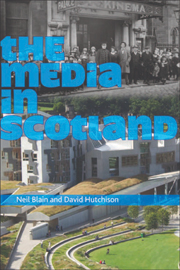Book contents
- Frontmatter
- Contents
- Preface
- Framing the Discussion
- The Historical Context
- Screen and Sound
- 7 Three Ring Circus: Television Drama about, by and for Scotland
- 8 ‘Nae Bevvying, Nae Skiving’: Language and Community in the Scottish Soap Opera
- 9 Broadcast Comedy
- 10 Contemporary Scottish Cinema
- 11 Radio and Popular Music
- Themes and Futures
- Select Bibliography
- Notes on Contributors
- Index
7 - Three Ring Circus: Television Drama about, by and for Scotland
from Screen and Sound
Published online by Cambridge University Press: 05 August 2013
- Frontmatter
- Contents
- Preface
- Framing the Discussion
- The Historical Context
- Screen and Sound
- 7 Three Ring Circus: Television Drama about, by and for Scotland
- 8 ‘Nae Bevvying, Nae Skiving’: Language and Community in the Scottish Soap Opera
- 9 Broadcast Comedy
- 10 Contemporary Scottish Cinema
- 11 Radio and Popular Music
- Themes and Futures
- Select Bibliography
- Notes on Contributors
- Index
Summary
‘It's shite [sic] being Scottish.’ So began a vituperative article by Tom Little in Scotland on Sunday on 19 November 2006. Having just watched the highlights of the 2006 BAFTA Scotland awards on TV, Little was moved to quote Renton, Ewan McGregor's character in the film version of Trainspotting (1996). Where, asked Little, was the quality of BBC Scotland's drama output to justify its current £180 million a year licence fee income? Looking back to the earlier success of adaptations such as that of Iain Banks' The Crow Road ten years before (BBC TV 1996) and rejecting current BBC Scotland claims that it was fulfilling its role as a drama-maker for Scotland through production of its twice-weekly soap River City (BBC TV 2002), Little asked three pointed, if harsh, questions:
Question one: what was the most innovative drama serial broadcast on the BBC in 2006? Answer: Life on Mars. Question two: what was the most interesting drama serial broadcast on the BBC in 2005? Answer: the revived Dr Who. Question three: what connects the two shows, other than the slavish devotion of the sort of sci-fi anorak who describes his religion as ‘Jedi’ in the national census? Answer: they were massive critical successes, earned vast amounts of money in overseas sales – and they were both made by BBC Wales. And, as far as I am aware, the Beeb in the principality has not had to cancel its own soap opera, Pobol y Cwm, which has run since 1974, to pay for these commissions.
(Little 2006)- Type
- Chapter
- Information
- The Media in Scotland , pp. 107 - 122Publisher: Edinburgh University PressPrint publication year: 2008

